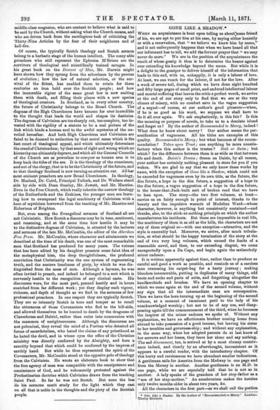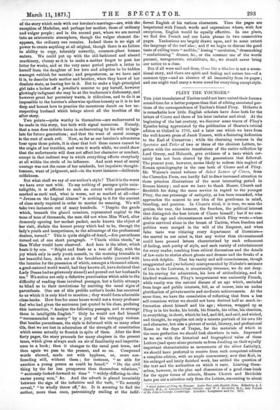GONE LIKE A SHADOW.*
WHEN an acquaintance is bent upon telling us about)ome friend of his, we are apt to put him at his ease, by saying either honestly or with a reservation, that "we believe we know him by name," and it not unfrequently happens that when we have heard all that our informant has to tell, we add the fervent prayer that " we may never do more." We are in the position of the acquaintance the result of whose gossip it thus is to determine the hearer against ever extending his knowledge beyond the name. But while it is a delight to the gossiper to deliver himself of the information that leads to this end, with us, unhappily, it is only a labour of love. At least, we can vouch for the labour, if not for the love. After a week of severe toil, during which we have done eight hundred and fifty large pages of small print, and endured intellectual labour and mental suffering that leaves the critic a perfect wreck, we arrive at the end of our story only to find that we are at the very climax of misery, with no comfort save in the vague suggestion of a sequel—of course, at our author's good pleasure—when, if he is as good as his word, we suppose we shall have to do it all over again. We ask emphatically, is this fair? Is this the meaning or purpose of novels, to take us to a desolate island and forget us ? By the author of Recommended to Mercy, indeed ! What does he know about mercy ? Our author seems the per- sonification of vagueness. All his titles are examples of this quality. Recommended to Mercy ; but what becomes of the recom- mendation? Taken upon Trust ; can anything be more unsatis- factory when this author is the trustee ? Sink or Swim ; but which? for the difference between them is as wide as that between life and death. Daisie's Dream ; dream on Daisie, by all means, your author has certainly nothing pleasant in store for you if you waken. We are glad to say that we only know these works by name, with the exception of Gone like a Shadow, which could not be exceeded for vagueness even by its own title, as the future, the dim future, a hope in the dim future, a suggestion of a hope in the dim future, a vague suggestion of a hope in the dim future, is the house-that-Jack-built sort of broken reed that we have to lean upon. The story—the two first volumes, at least— carries us on fairly enough in point of interest, thanks to the beauty and the impulsive warmth of Madeline Ward—whose character, however, is anything but consistently sustained—and thanks, also, to the stick-at-nothing principle on which the author manufactures his incidents. But these are impossible in real life, the machinery of them is as old as the hills, the characters are not any of them original or—with one exception—attractive, and the style is execrably bad. Moreover, we arrive, after much tribula- tion, at what should be the happy termination of the story at the end of two very long volumes, which exceed the limits of a reasonable novel, and then, to our exceeding disgust, we come unexpectedly upon a Da Capo, and begin again the melancholy minor cadence.
It is written apparently against time, rather than to produce as careful and good a work as possible, and reminds us of a careless man cramming his carpet-bag for a hasty journey ; making blunders innumerable, putting in duplicates of many things, odd boots and socks and parts of suits, and forgetting altogether the handkerchiefs and brushes. We have an opening chapter to which we come again at the end of the second volume, without any sign that all the intermediate ones are retrospective. Then we have the hero turning up at the beginning of the second volume, at a moment of imminent peril to the lady of his unacknowledged worship ; but not to be of any use, and disap- pearing again till the commencement of the third, when he becomes the inspirer of the minor cadence we spoke of. Without any explanation, we have an affectionate brother coming home from abroad to take possession of a good income, but leaving his sister to her troubles and governess-ship; and without any explanation, in the same way, when her adopted parents do at last know of her sorrows and her losses, they leave her alone and say nothing. The sad denouement, too, is arrived at by a most clumsy contriv- ance indeed, and clearly by an afterthought, inconsistent as it appears to a careful reader, with the introductory chapter. Of this hurry and carelessness we have abundant smaller indications. A gentleman sails for America from the Medway in one page and from the Mersey in another. Another gentleman is an M.D. in one page, while we are especially told that he is not so in another. A lady speaks of the grandson of her step-father as a "son of her step-mother." An anachronism makes the heroine only twelve months older in about two years, &c.
All the characters in the first part—as we shall call the portion
• Gone Like a Shadow. By the Author of "Recommended to Mercy." London: Tinsley Brothers.
of the story which ends with our heroine's marriage—are, with the exception of Madeline, and perhaps her mother, those of ordinary and vulgar people ; and in the second part, where we are moved into an aristocratic atmosphere, though the vulgar element dis- appears, the ordinary one remains. Indeed there is no sign of power to create anything at all original, though there is no failure in ability to copy, tolerably correctly, common-place human nature. We could put up with the old-fashioned and absurd machinery, clumsy as it is to make a mother forget to post her letter for weeks, and at the very same period permit a letter to herself from the daughter of her love and adoption to be hidden amongst rubbish for months ; and preposterous, as we have said it is, to describe both mother and brother, when they know of her desolate state, as leaving her in it. But to make a high-principled girl take a locket off a jeweller's counter to pay herself, however glowingly indignant she may be at the tradesman's dishonesty, and however great her pecuniary wants, is ridiculous, and to do it as impossible to the heroine's otherwise spotless honesty as it is to her deep and honest love to practise the monstrous deceit on her un- suspecting husband which brings about all the troubles of the after story.
Two points—quite worthy in themselves—are endeavoured to be made in this story, but both with signal unsuccess. Namely, that a man does infinite harm in endeavouriug by his will to legis- late for future generations ; and that the want of moral courage is the root of much evil. Now, as far as our heroine's adventures bear upon these points, it is clear that both these causes cannot be the origin of her troubles, and were it worth while, we could show that the unfortunate will does not affect her character or conduct, except in that indirect way in which everything affects everybody al all within the circle of its influence. And next want of moral courage was not the cause of her misdeeds, but impulsive thought- lessness, want of judgment, and—in the worst instance—deliberate selfishness.
But what shall we say of our author's style? That it is the worst we have ever met with. To say nothing of passages quite unin- telligible, it is afflicted to such an extent with parentheses— marked as such and, what is worse, not so marked at all—that 46 Jevons on the Logical Abacus" is nothing to it for the amount of close study required in order to master its meaning. We will take two instances out of many hundreds. "Despite the gauds which, beneath the glazed counters, represented capital to the tune of tens of thousands, the men did not when Miss Ward, after demurely opening her modest packet, made known the object of Liner visit, disdain the honest penny which had to be, through the lady's youth and inexperience, to the advantage of the professional dealers, turned." This is quite sleight-of-hand,—five parentheses turned out of one short paragraph. " Vheels vithin vheels," as Sam Weller would have observed. And here is the other, which beats it by one. "Bright and fresh as a rose of May, with the joy which only in early youth cometh, in the morning traceable in her beautiful face, Ada sat at the breakfast-table (covered with the luxuries for the possession of which, amongst a thousand others, a good-natured world would, had they known all, have declared that Lady Deane had so grievously sinned) and poured out her husband's tea." We notice not only a defective punctuation which adds to the difficulty of reading these involved passages, but a feeble attempt to blind us to their involutions by omitting the usual signs of parenthesis. One use of this prolific author's books has occurred to us which it is only kind to mention ; they would form admirable elass-books. How free for some hours would not a weary professor feel who had given the sentences just quoted to his class, prefixing this instruction, "Analyse the following passages, and re-arrange them in intelligible English." Only he would not find himself "recommended to mercy" by a jury of his unhappy victims. But besides parentheses, the style is deformed with so many other ills, that we are lost in admiration of the strength of constitution which seems actually to flourish in spite of them. After the first forty pages, the story proceeds for many chapters in the present tense, which gives always such an air of familiarity and impertin- ence to a book ; then it changes to the usual past tense, and then again we pass to the present, and so on. Compound words abound, made out with hyphens, or, more con- founding still, without them ; for instance, " as able for exertion a young person as could be found." "Do the civil thing by the far less prosperous than themselves relations," "anxiously-looked-forward-to time" "widely-differing-in-cha- racter young men," &c. And the adverb is placed invariably between the sign of the infinitive and the verb, "To secretly reveal," "to wholly throw off," &c. It is amusing to find the author, more than once, patronizingly smiling at the indif-
ferent English of his various characters. Then the pages are bespattered with French words and expressions where, with few exceptions, English would be equally effective. In one place, we find five French and one Latin phrase in two consecutive pages. Yankeeisms are largely drawn upon, and to some extent the language of the turf also ; and if we begin to discuss the good taste of calling tears "audible," kissing "osculation," dressmaking " confectioniug " dresses, &c., or the constant use of the words peccant, unregenerate, rehabilitate, &c., we should never bring our notice to a close.
But if all were said and done, Gone like a Shadow is not a sensa- tional story, and there are spirit and feeling and nature too—of a common type—and an absence of all immorality from its pages ; and one might read many a worse novel for everything except style.



































 Previous page
Previous page